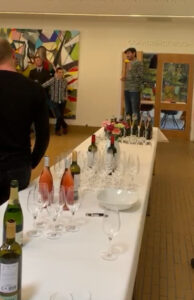
On 21 September 2019, I was invited to give a speech at the departure reception of Professor Morten Kyndrup, former executive director and founder of Aarhus Institute of Advanced Studies, honoring his work in establishing the institute. I ended my address with a mention of a short skit I did with a Dutch friend for a Norwegian-American friend’s birthday in August 2019. The birthday deal? No gifts, only performances.
My Dutch friend and I had been speaking a lot about a concept we were both enamoured by and heard often in Denmark spoken by Danes to non-Danes when the latter try to make sense of many things Danish: “Well, you see, it’s just not quite the same.”
The sketch went like this. I am Preben, a common name for late middle-aged Danish men. I am 55, I drive a truck, and I live in Viborg, a city 65 kilometres from Aarhus. Preben is quite happy to tell people, especially foreigners, in thickly accented Danish English about all the quintessential effects of Denmark. My Dutch mate is Jaap from the Netherlands, who has been in Denmark for two years.
Preben asks Jaap, “Have you heard of hygge?” “Oh, you mean cosiness?” says Jaap. “Ah, it’s just not quite the same.” Jaap adds: “In Dutch we call it gezelligheid.” The conversation continues. “So, Jaap, have you heard of rugbrød?” “Oh, you mean rye bread?” “Um, it’s just not quite the same.” Preben prods further. “We have really many special cakes in Denmark. There is one we always eat at birthday parties.” “Jaap interjects, “You mean lagkage?” “Erm, you know, it’s just not quite the same.” Jaap is getting a little bored, but gets really excited when a key idea is brought up, one which seems to be oh-so Danish: tryghed. Jaap is sure he has this one in the bag: “That means reassurance, safety, security, and the ideal that all bad things, matters which are not hyggelige, are kept as far away as possible from Danish society.” Once again, Preben offers his appraisal. “Well, sorry, it’s just not quite the same.”
One starts pondering about to what extent languages have unique words that are really untranslatable. There are several books and websites* that list untranslatable words from many languages. They typically give the word in a foreign language, and then add the translation. Ergo, those words are not untranslatable. OK, these words are not translatable with a single word, but they can be circumscribed. You just need more words. A linguistic dogma tells us that everything can be expressed in every natural language. According to proponents of Natural Semantic Metalanguage, all meanings of all words in all languages can be reduced and circumscribed to some 65 semantic primes or universals.
People want to be different, but they turn out the same. People want to be the same, but they turn out to be different. It is the same with words. But it’s just not quite the same because words themselves have no willpower.
*Some websites with untranslatable words:
Some books:
by Howard Rheingold
by Ella Frances Sanders
by Yee-Lum Mak and Kelsey Garrity-Riley
Joshua Nash’s areas of research are linguistics, particularly pidgin and creole studies, the anthropology, ethnography, and geography of the Pacific, and island studies. He has written in architectural history, environmental humanities, creative writing, Indian ecology and environmentalism, migration and mobility studies, and social science in Australia and Oceania more broadly. Joshua loves several islands in the Pacific and in and around the continents of Australia and Europe.







